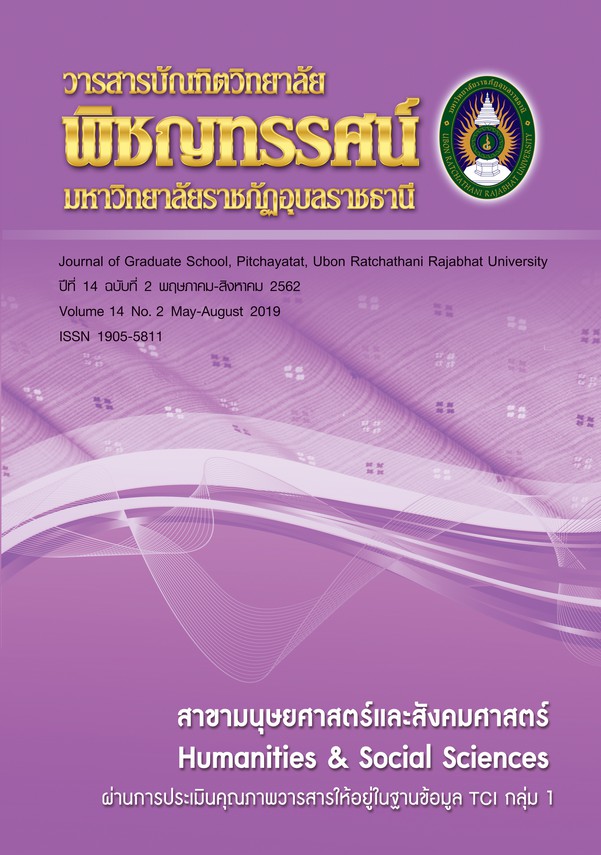การเปรียบเทียบผลสัมฤทธิ์ทางการเรียนในการเรียนรู้วิชาคอมพิวเตอร์และการรู้เท่าทันในยุคดิจิทัล โดยใช้แนวคิดการจัดการเรียนรู้แบบห้องเรียนกลับด้านและแบบห้องเรียนปกติ
คำสำคัญ:
การเรียนแบบกลับด้าน, ผลสัมฤทธิ์ทางการเรียนบทคัดย่อ
การวิจัยครั้งนี้ มีวัตถุประสงค์เพื่อเปรียบเทียบผลสัมฤทธิ์ทางการเรียนในการเรียนรู้วิชาคอมพิวเตอร์และการรู้เท่าทันในยุคดิจิทัล ที่เรียนโดยการจัดการเรียนรู้แบบห้องเรียนกลับด้านและแบบห้องเรียนปกติ ตัวอย่างคือ นักศึกษาชั้นปีที่ 1 มหาวิทยาลัยราชภัฏอุบลราชธานี จำนวน 93 คน เลือกตัวอย่างแบบการสุ่มแบบแบ่งชั้น โดยแบ่งออกเป็น 2 กลุ่ม คือกลุ่มทดลอง เรียนโดยจัดการเรียนรู้แบบห้องเรียนกลับด้าน และกลุ่มควบคุม เรียนโดยจัดการเรียนรู้แบบห้องเรียนปกติ แต่ละกลุ่มประกอบด้วยผู้เรียนที่มีระดับทักษะพื้นฐานด้านคอมพิวเตอร์ทั้งระดับสูง ปานกลาง และต่ำ ดำเนินการใช้วิธีวิจัยเชิงทดลอง เครื่องมือที่ใช้ในการทดลองประกอบด้วย แบบทดสอบความรู้พื้นฐานด้านคอมพิวเตอร์ แผนการจัดการเรียนรู้ และแบบทดสอบผลสัมฤทธิ์ทางการเรียน การวิเคราะห์ข้อมูลใช้การหาค่าเฉลี่ย ค่าส่วนเบี่ยงเบนมาตรฐาน และการทดสอบที ผลการศึกษาพบว่า ผลสัมฤทธิ์ทางการเรียนในการเรียนวิชาคอมพิวเตอร์และการรู้เท่าทันในยุคดิจิทัล ผู้เรียนที่เรียนโดยห้องเรียนกลับด้านมีผลสัมฤทธิ์ทางการเรียนสูงกว่าผู้เรียนโดยห้องเรียนแบบปกติอย่างมีนัยสำคัญที่ระดับ .05
เอกสารอ้างอิง
บุปผชาติ ทัฬหิกรณ์. การประยุกต์ใช้เทคโนโลยีสารสนเทศในการเรียนการสอน. พิมพ์ครั้งที่ 2. กรุงเทพฯ: โครงการเทคโนโลยีสารสนเทศตามพระราชดำริสมเด็จพระเทพรัตนราชสุดาฯ สยามบรมราชกุมารี, 2552.
ลัทธพล ด่านสกุล. ผลของการจัดการเรียนรู้แบบห้องเรียนกลับด้านด้วยพอดคาสต์โดยใช้กลวิธีการกำกับตนเองที่มีผลต่อผลสัมฤทธิ์ทางการเรียนเรื่องโครงสร้างการโปรแกรมและการกำกับตนเองของนักเรียนห้องเรียนพิเศษวิทยาศาสตร์. วิทยานิพนธ์วิทยาศาสตรมหาบัณฑิต สถาบันเทคโนโลยีพระจอมเกล้าเจ้าคุณทหารลาดกระบัง,2558.
วิจารณ์ พานิช. ครูเพื่อศิษย์สร้างห้องเรียนกลับทาง. กรุงเทพฯ: เอสอาร์พริ้นติ้งแมสโปรดักส์, 2556.
วิจารณ์ พานิช. วิถีสร้างการเรียนรู้เพื่อศิษย์ในศตวรรษที่ 21. กรุงเทพฯ: มูลนิธิสดศรี-สฤษดิ์วงศ์, 2551.
วิจารณ์ พานิช. วิถีสร้างการเรียนรู้เพื่อศิษย์ในศตวรรษที่ 21. กรุงเทพฯ: มูลนิธิสดศรี-สฤษดิ์วงศ์, 2555.
สุรศักดิ์ ปาเฮ. ห้องเรียนกลับทาง : ห้องเรียนมิติใหม่ในศตวรรษที่ 21. (ออนไลน์) 2556 (อ้างเมื่อ 25 มิถุนายน 2561). จาก https://phd.mbuisc.ac.th/academic/flipped%20classroom2.pdf.)
สุวณี อึ่งวรากร. ครู: อภิวัฒน์การเรียนรู้สู่คุณภาพการศึกษาในศตวรรษที่ 21. วารสารเครือข่ายวิทยาลัยพยาบาลและการสาธารณสุขภาคใต้. 2, 1(2558): 65-78.
สุพัตรา อุตมัง. แนวคิดห้องเรียนกลับด้าน: ภาพฝันที่เป็นจริงในวิชาภาษาไทย. วารสารวิชาการศึกษาศาสตร์ คณะศึกษาศาสตร์ มหาวิทยาลัยศรีนครินทรวิโรฒ, 16, 1 (2558): 51-58.
Bergmann, J. and Sams, A. Flip Your Classroom Reach Every Student in Every Class Every Day. United States of America: ISTE and ASCD, 2012.
Likert, R. “The Method of Constructing and Attitude Scale”, Reading in Attitude Theory and Measurement. Fishbeic, Matin, Ed. New York : Wiley & Son, 1967.
Lloyd, J. E., and Ebener, W. C. Inverting a nonmajor’s biology class: Using video lectures, online resources, and a
student response system to facilitate deeper learning. Teaching and Learning with Technology. 3, 2 (2014): 31-39.
Marlowe, C. A. The Effect of the Flipped Classroom on Student Achievement and Stress. Montana. Montana State
University. (Online) 2012 (Cite 2015 November 26) Available from : https://scholarworks.montana.edu/xmlui/bitstream/
Sun, J. C. Y. and Wu, Y. T. Analysis of Learning Achievement and Teacher Student Interactions in Flipped and Conventional Classrooms. International Review of Research in Open and Distributed Learning. 17, 1 (2016): 79.
Tune, J. D.,Sturek,M.andBasile,D. P. Flipped classroom model improves Graduate student performance in Cardiovascular, respiratory, adrenal Physiology. Indiana.Indiana University School of Medicine. Advances in Physiology Education. 37,4 (2013): 316-320.
ดาวน์โหลด
เผยแพร่แล้ว
รูปแบบการอ้างอิง
ฉบับ
ประเภทบทความ
สัญญาอนุญาต
บทความทุกเรื่องได้รับการตรวจความถูกต้องทางวิชาการโดยผู้ทรงคุณวุฒิภายนอกอย่างน้อย 3 คน ความคิดเห็นในวารสารพิชญทรรศน์เป็นความคิดเห็นของผู้นิพนธ์มิใช่ความคิดเห็นของผู้จัดทำ จึงมิใช่ความรับผิดชอบของวารสารพิชญทรรศน์ และบทความในวารสารพิชญทรรศน์สงวนสิทธิ์ตามกฎหมายไทย การจะนำไปเผยแพร่ต้องได้รับอนุญาตเป็นลายลักษณ์อักษรจากกองบรรณาธิการ





